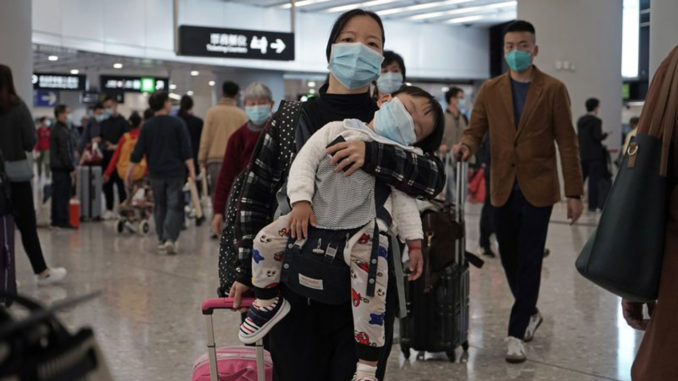
The International Air Transport Association (IATA) yesterday warned that Nigeria is at risk of losing 2.2 million overseas-bound passengers and $434 million revenue loss, if the coronavirus spread continues to escalate.
The association that represents some 290 airlines said the gloomy outlook was not peculiar to Nigeria, but spreads across the region and warrant emergency support for the airlines.
IATA, in a market analysis released Thursday, appealed to governments in Africa and the Middle East, to provide emergency support to airlines as they fight for survival due to the evaporation of air travel demand as a result of the covid-19 crisis.
In a related development, Air Peace airlines yesterday scaled down operations, disclosing plans to suspend Dubai operations in response to the adverse effects of the pandemic.
IATA had published on March 5, the disruptions from covid-19 could result in 853,000 loss in passenger volumes and $170 million loss in base revenues in Nigeria.
The disruptions to air travel could also put at risk over 22,200 jobs in the country. If the situation spreads further, approximately 2.2 million passengers and $434 million of revenues could be lost.
IATA’s Director General and Chief Executive Officer (CEO), Alexandre de Juniac, said stopping the spread of covid-19 is the top priority of governments.
“But they must be aware that the public health emergency has now become a catastrophe for economies and for aviation. The scale of the current industry crisis is much worse and far more widespread than 9/11, SARS or the 2008 Global Financial Crisis.
“Airlines are fighting for survival. Many routes have been suspended in Africa and Middle East and airlines have seen demand fall by as much as 60 per cent on remaining ones. Millions of jobs are at stake. Airlines need urgent government action if they are to emerge from this in a fit state to help the world recover, once covid-19 is beaten,” de Juniac said.
Extensive cost cutting measures are being implemented by the region’s carriers to mitigate the financial impact of covid-19. However, due to flight bans as well as international and regional travel restrictions, airlines’ revenues are plummeting—outstripping the scope of even the most drastic cost containment measures.
With average cash reserves of approximately two months in the region, airlines are facing a liquidity and existential crisis. Support measures are urgently needed. On a global basis, IATA estimates that emergency aid of up to $200 billion is required.
Options proposed by IATA include: direct financial support to passenger and cargo carriers to compensate for reduced revenues and liquidity attributable to travel restrictions imposed as a result of covid-19.
Loans, loan guarantees and support for the corporate bond market by governments or central banks. “The corporate bond market is a vital source of finance, but the eligibility of corporate bonds for central bank support needs to be extended and guaranteed by governments to provide access for a wider range of companies.”
Also, rebates on payroll taxes paid to date in 2020 and/or an extension of payment terms for the rest of 2020, along with a temporary waiver of ticket taxes and other Government-imposed levies.
IATA Regional Vice President Africa, Middle East, Muhammad Al Bakri, said several governments in Africa and the Middle East had already committed national aid for covid-19 including Saudi Arabia, the United Arab Emirates, Qatar, Bahrain, Egypt, Nigeria and Mauritius.
“Our demand is that airlines, which are essential to all modern economies, are given urgent consideration. This will help keep them alive and ensure airline staff – and people working in allied sectors – have jobs to come back to at the end of the crisis. It will enable global supply chains to continue functioning and provide the connectivity that tourism and trade will depend on if they are to contribute to rapid post-pandemic economic growth,” Al Bakri said.
Air Peace airline said it took the decisive scale down decision after an emergency meeting with its top management staff to review its operations in the face of the disease.
The management also announced several measures aimed at addressing the adverse effects occasioned by the disease. The Chief Operating Officer (COO) of Air Peace, Toyin Olajide, said the airline also took the decision to cut down its flights following a tremendous decline in passenger traffic and the need to cut costs.
She said the airline would be suspending its operations to Dakar-Senegal and Monrovia-Liberia and cutting down its Freetown-Sierra Leone operations and Banjul-Gambia operations to one flight a week
She disclosed that the airline would also be reducing its operations into Accra from Lagos to just two flights daily and suspends its Abuja-Accra operations.
“On the domestic scene, we are reducing our frequencies while at the same time, restructuring our operations by deploying our hoppers to more airports.
“Our international operations into Dubai through Sharjah International airport shall be suspended from next week as the United Arab Emirates (UAE) has shut its airports to nationals from other countries including but not limited to Nigeria,” Olajide said.
Africa’s air transport industry’s economic contribution is estimated at $55.8 billion supporting 6.2 million jobs and contributing 2.6 per cent to Gross Domestic Product (GDP). In the Middle East air transport’s economic contribution is estimated at $130 billion supporting 2.4 million jobs and contributing 4.4 per cent to GDP.
Since the end of January, thousands of passenger flights have been cancelled in Africa. This is expected to increase exponentially with the implementation of additional measures in different countries.
International bookings in Africa are down roughly 20 per cent in March and April, domestic bookings have fallen by about 15 per cent in March and 25 per cent in April, according to the latest data
African airlines had lost $4.4 billion in revenue as at 11 March 2020. Ticket refunds have increased by 75 per cent in 2020 compared to the same period in 2019.
END

Be the first to comment